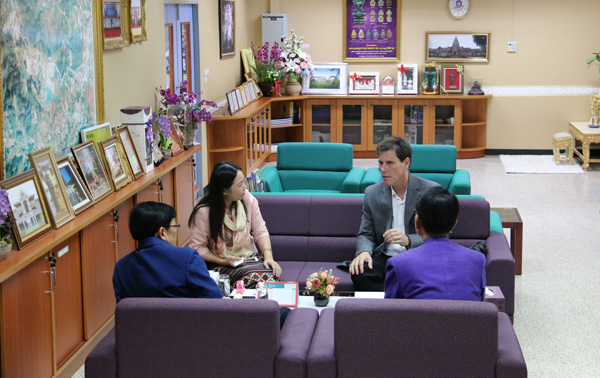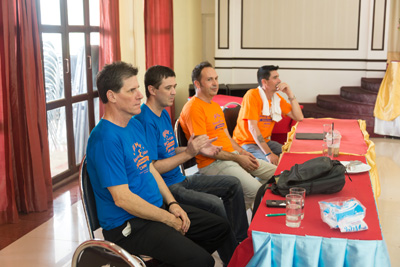As noted in a post below, in early February I received an invitation from the Dean of the College of Business at Phayao University. It was a great pleasure to meet Dr. Anusorn, the President and Provost, as well as the faculty in Education, Computer Science and Business. On Saturday I also taught a group of MBA students who attend a weekend program. The faculty who helped me with tours, dinners and meetings with students were absolutely wonderful. I was asked many times to return Phayao as a visiting scholar, teacher or as part of the Fulbright program. I certainly hope to have the opportunity.
I arrived on a flight from Don Meuang airport in the early afternoon. I was whisked to the city of Phayao by a van labeled University of Phayao College of Management. My first stop was to check into the university hostel, a motel-like set of buildings located on the campus. It was basic accommodations but as it turned out, Dr. Anusorn had a busy agenda planned for my visit, so I did not spend much time in the hostel.
My first stop was the executive offices, where I met with the president and the provost. It was no small honor to be sure. They were very gracious hosts, taking pains to explain the history of the university (this year will graduate their first class) and their vision for the institution. As noted, the first undergraduate class is 2015. In context, this is a remarkable accomplishment -- the university is just 5 years old and is already home to more than 30,000 students, with 16 faculty (colleges) including a medical school. Briefly, Phayao was formerly a satellite campus of Naresuan University in Phitsanulok, much the same as the Mukdahan campus is a satellite campus of Ubon Ratchani University, with some major differences of course.


After spending about an hour with the president and Provost, we drove into the town of Phayao to attend a celebration for local school administrators. There were about 100 in attendance at a recognition dinner, honoring this group for working so hard to support the university. The party was held on the lake (photographs to follow) and included quite an entertaining show, including karaoke, a traditional Thai dancing troupe and an unusual yodeling contest that I -- somehow -- found my self competing. Yes, I competed in a yodeling contest!! Well, I am a strange man in a strange land, all that can be done in such circumstances is to go with the flow and be a good sport. Everybody was entertained and I have a memento to remember that evening.

On Saturday, we had a busy agenda. I met with students and faculty from the college of management. I gave an impromptu demonstration of FSU and her programs, followed by a lecture on small business ideation and idea refinement. After we finished, the faculty took me to lunch at an extraordinary restaurant.Again, my hosts were very attentive and made sure that everything was arranged. The food was fantastic and the company was delightful.
My next stop was the IT center. We toured their hardware area and then proceeded to the e-learning facilities. Part of my grant responsibilities for Fulbright is to organize the online learning system for the Mukdahan campus (which has expanded to include the main campus) and so this was a very important stop for me. I was surprised (and reassured) to learn that the University of Phayao also uses Moodle. While the director of the e-learning center didn't speak English (and my Thai is simply awful) he became very interested in seeing how we had connected Google apps to Moodle via the OAUTH plugin. Our communication improved once we got down to version numbers, plugins and issues related to themes.
Since the university seems to have problems getting their faculty to create online courses, everybody in the learning center was particularly interested in learning more about how FSU encourages faculty to create online content. After our conversation, they were thankful to learn about the role of instructional designers and the financial rewards offered to faculty who develop online courses. Aside from music, computer science is a universal language and so we all got along famously. I made an introduction to the IT group at UBU Ubon as they are now working on the Moodle site and they hope to connect with Dr. Phonlob for advice on the best way to proceed with policies and maintenance.


My last full day on campus included a lecture to MBA students. The lecture focused on small business and IT entrepreneurship. After the lecture, we took a tour of and a tour of the local business community. We also visited several temples, including a very interesting site where a monk had spent his life relieving images of Buddha on a variety exposed rock near his temple, on one of the local mountains. The work is spectacular - a collection of about 30 images that is no less than high art. Unfortunately, In the process of developing this beautiful imagery, the work exposed the monk to toxic levels of dust. Although he is not well now, I did have a chance to meet him briefly. Of all the places I visited in Phayao, this was certainly the most fascinating.


Among the other cultural stops in Phayao were a visit with a local craftswoman who makes all types of accessories from water Hyacinth reeds; a trip to a temple that featured naga/pyana, a temple in the middle of lake Phayao and the White temple in Chiang Rai. Overall, the trip was incredible. Many thanks to the faculty and staff with Phayao University, I hope to return there at some point -- I will certainly draft a cooperative agreement when i return to Tallahassee. The university is particularly we suited for an international program. My trip also included many excellent dining experiences, including a visit to the best local restaurant for Cao Soi Gai.

As noted, I met with the College of Business information management faculty, the College of Education and the online learning group (similar to FSU's Office of Distance Learning). Our discussions focused on curriculum development (business), teacher training (education) and online learning. The most interesting aspect of the trip is the infrastructure of the university. The university has student/faculty housing, a large institution in a region that is somewhat rural (removed from the more crazy tourist trappings) and safe area, a highly educated faculty and student body that have reasonable English Language capabilities. In a nutshell, it's perfect for an international program. Phayao University is so much further along than the Mukdahan campus in terms of curriculum and mission that there wasn't much ground to cover on these points. Regardless, the trip was entertaining and productive.

















 The new tract of land is also occupied by a military unit of about 100 light infantry. It seems this unit is responsible for border security, interdiction (drugs and illegal aliens) and policing the Mukdahan Province. Interestingly it seems that this was previously a field unit that was operating without a formal base of operations. The director of UBU Mukdahan somehow knows the commander of the unit and so she invited the commander to use part of the mountain to create an ad hoc base for his men. He accepted and so now the campus has, well, an incredible amount of security.
The new tract of land is also occupied by a military unit of about 100 light infantry. It seems this unit is responsible for border security, interdiction (drugs and illegal aliens) and policing the Mukdahan Province. Interestingly it seems that this was previously a field unit that was operating without a formal base of operations. The director of UBU Mukdahan somehow knows the commander of the unit and so she invited the commander to use part of the mountain to create an ad hoc base for his men. He accepted and so now the campus has, well, an incredible amount of security. h yours truly as the first of many pack-rats. After about 100 meters, the train of 100 people stopped briefly for photos of my hand-off of the Buddha to the commander, who was next in line. The stop, hand-off-and-photo shoot continued for the length of the 5 kilometer hike to the mountain shrine.
h yours truly as the first of many pack-rats. After about 100 meters, the train of 100 people stopped briefly for photos of my hand-off of the Buddha to the commander, who was next in line. The stop, hand-off-and-photo shoot continued for the length of the 5 kilometer hike to the mountain shrine.
 During my preparations to teach ICT enterprise in Mukdahan, I spent a lot of time researching entrepreneurial activity in Thailand. I drew information from two primary sources to collect information; a Thai government online warehouse of business statistics and the GEM Global Entrepreneurship Monitor. While I use GEM when I prepare to teach my ICT enterprise class in Florida, I did not pay much attention to who (in the US) authors the report.
During my preparations to teach ICT enterprise in Mukdahan, I spent a lot of time researching entrepreneurial activity in Thailand. I drew information from two primary sources to collect information; a Thai government online warehouse of business statistics and the GEM Global Entrepreneurship Monitor. While I use GEM when I prepare to teach my ICT enterprise class in Florida, I did not pay much attention to who (in the US) authors the report. Bangkok University and the Mukdahan campus. They were also very interested in collaborating with Florida State University, perhaps through a cooperative agreement that might include student and faculty exchanges.
Bangkok University and the Mukdahan campus. They were also very interested in collaborating with Florida State University, perhaps through a cooperative agreement that might include student and faculty exchanges. the Moodle community offers a plugin which is based on OAUTH and there have been a number of schools (universities, colleges) that are using these two systems together. Moodle docs has some instructions and most questions are answered in one of several forums. On Wednesday the 11th of February, I went with two colleagues from the Mukdahan campus to meet with the UBU IT administrators.
the Moodle community offers a plugin which is based on OAUTH and there have been a number of schools (universities, colleges) that are using these two systems together. Moodle docs has some instructions and most questions are answered in one of several forums. On Wednesday the 11th of February, I went with two colleagues from the Mukdahan campus to meet with the UBU IT administrators.